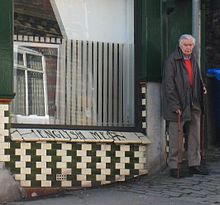Richard Gregory
| Richard Gregory | |
|---|---|

Richard Gregory standing outside the café on St Michael's Hill, Bristol, which inspired his (re-)discovery of the "café wall illusion", February 2010.
|
|
| Born | Richard Langton Gregory 24 July 1923 London, England |
| Died | 17 May 2010 (aged 86) Bristol, England |
| Nationality | British |
| Fields | Psychology, Neuropsychology |
| Notable awards | Michael Faraday Prize (1992) |
Richard Langton Gregory CBE FRS FRSE (24 July 1923 – 17 May 2010) was a British psychologist and Emeritus Professor of Neuropsychology at the University of Bristol.
Richard Gregory was born in London, the son of Christopher Clive Langton Gregory and his first wife Helen Patricia (née Gibson). His father was an astronomer and the first Director of the University of London Observatory.
Gregory served with the Royal Air Force's Signals branch during World War II, and after the war earned an RAF scholarship to Downing College, Cambridge. One of Sir Frederic Bartlett's last pupils at Cambridge, Gregory admitted to having been inspired by him. He was made an Honorary Fellow of Downing in 1999.
In 1967, with Prof. Donald Michie and Prof. Christopher Longuet-Higgins FRS, he founded the Department of Machine Intelligence and Perception, a forerunner of the Department of Artificial Intelligence at the University of Edinburgh. He was Head of the Bionics Research Laboratory, Professor of Bionics, and Department chairman 1968–70. Gregory was founding editor of the journal Perception (1972), which emphasized phenomenology and novel percepts produced by new stimuli. He was a founding member of the Experimental Psychology Society and served as its President in 1981-2.
...
Wikipedia
